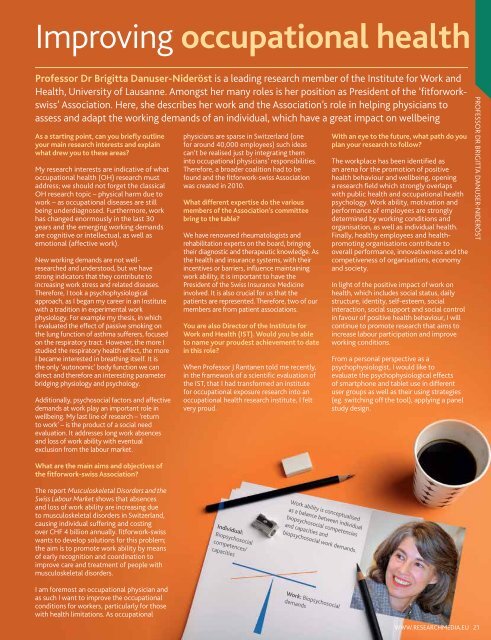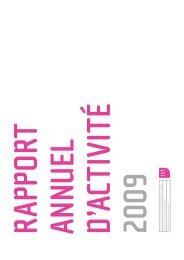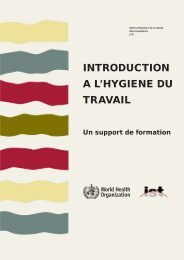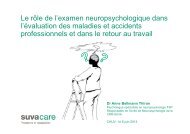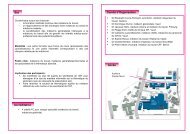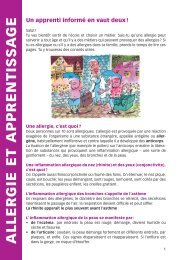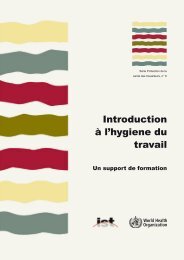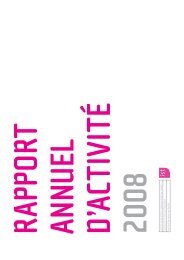Improving occupational health - Institut universitaire romand de ...
Improving occupational health - Institut universitaire romand de ...
Improving occupational health - Institut universitaire romand de ...
You also want an ePaper? Increase the reach of your titles
YUMPU automatically turns print PDFs into web optimized ePapers that Google loves.
professor dr brigitta danuser-ni<strong>de</strong>rÖstProDocHealth@WorkProDoc is a joint initiative between three universities in Switzerland toprovi<strong>de</strong> education and research opportunities for PhD stu<strong>de</strong>nts acrossthe country. Importantly, the scheme is set to produce a new generationwho will help strengthen Switzerland’s research into <strong>occupational</strong> <strong>health</strong>and, better still, contribute on an international platformDespite huge efforts being ma<strong>de</strong> inEuropean countries to prevent <strong>occupational</strong>diseases and injuries, the cost of these afflictionsis still worryingly high and continues to rise. Tocombat this alarming trend, drastic action mustbe taken. However, the pitfalls of <strong>occupational</strong><strong>health</strong> (OH) are not simply finance-related. Inor<strong>de</strong>r to effect a shift in expenditure, generalun<strong>de</strong>rstanding and treatment of OH needsto improve. Many believe that it should nowbe consi<strong>de</strong>red one of the main public <strong>health</strong>problems – a social, as well as an economicneed. In<strong>de</strong>ed, the most common OH problemsrange wi<strong>de</strong>ly, from musculoskeletal injuryto mental <strong>health</strong> problems. Furthermore,continuing <strong>de</strong>mographic <strong>de</strong>velopments, aswell as the intensification and accelerationof the working society and the increasingcompetitiveness of the global economy,accentuate the importance of <strong>health</strong>, workability and workforce performance.It is paramount, therefore, that employers andgovernments analyse the situation for their ownworkforce. For example, it must be establishedwhether all employees have access to an OHservice and, if so, whether it is functional inresponding to people’s needs. Such basic,preemptive measures are fundamental in earlyrecognition of occupation-caused and related<strong>health</strong> problems. Overall, access to and qualityof OH services has to be improved. One wayof ensuring that the necessary improvementsare ma<strong>de</strong> is to provi<strong>de</strong> better research an<strong>de</strong>ducation surrounding OH. These very needs arebeing diligently tackled by a group of aca<strong>de</strong>micinstitutions, led by Professor Dr BrigittaDanuser-Ni<strong>de</strong>röst.ProDoc <strong>health</strong>@workFor Danuser-Ni<strong>de</strong>röst, OH research shouldbe interdisciplinary, covering epi<strong>de</strong>miology,chemistry, physics, engineering, medical,psychological and organisational research.Her team consi<strong>de</strong>rs their OH research to beneed-driven, taking into account the economicstructure as well as the social and medicalsystems of each particular country.To ensure that this approach to OH research isimplemented at the earliest possible stage, theparticipating institutions have implemented‘ProDoc Health@Work’ for PhD stu<strong>de</strong>nts. Thisinitiative offers a formal programme in whichOH PhD stu<strong>de</strong>nts can acquire basic skills andknowledge, as well as being given the opportunityto network with other PhD stu<strong>de</strong>nts andresearchers working in similar fields. However,most importantly of all, the programmeproduces a number of stu<strong>de</strong>nts who, in future,will help strengthen existing research groups andconsolidate OH research in Switzerland, in aninternationally competitive environment.The course offers modules which target specialresearch and methods skills. Specifically, theycover overviews of <strong>occupational</strong>, organisationaland public <strong>health</strong> transdisciplinary skills.Furthermore, stu<strong>de</strong>nts complete exposureassessments, epi<strong>de</strong>miologic OH research andqualitative research, and must also consi<strong>de</strong>rresearch method triangulation, gen<strong>de</strong>r studiesand company epi<strong>de</strong>miology.Beyond <strong>health</strong>, the programme and its lea<strong>de</strong>rshope to stress that OH research should22 International innovation
enlarge its focus to ‘a working life participationperspective’. This means incorporating factorssuch as work ability, quality of working life,motivation and engagement, as well as microandmacroeconomics, management and thesocietal perspective.The importance of collaborationThree universities contribute to the scheme– the University of Zurich, ETH Zürich andthe University of Lausanne. This collaborativeaspect has certainly informed the success of theprogramme. The research centres are localised inthe two dominant language areas of Switzerlandand all three offer the opportunity to obtain aPhD in OH. The Zurich partners and the <strong>Institut</strong>efor Work and Health (IST) of the University ofLausanne have been collaborating on the MASin Work and Health since 1993. “Partnershipsare important everywhere today, but especiallywhen resources are sparse – as is the case withOH in Switzerland,” Danuser-Ni<strong>de</strong>röst explains.The central i<strong>de</strong>as of ProDoc were created byvarious researchers from the three institutions.Since then, the programme has continued tobe collaboratively <strong>de</strong>veloped. This methodsuccessfully brings together different OHresearch approaches and topics. The PhDstu<strong>de</strong>nts therefore profit from experiencingthe advantages and avoiding the pitfalls ofthese different approaches, through knowledgeof a wi<strong>de</strong> range of previous PhD stu<strong>de</strong>ntprojects. Additionally, the collaborationgives the programme <strong>de</strong>pth, as differentresearchers represent a variety of OH researchmethodologies and networks.Complex research andthe project’s challengesThe successful implementation of a newcollaborative PhD programme is not withoutits challenges. For instance, the spectrumof OH research in Switzerland currentlybeing conducted – including mixed chemicaland physical exposures to newly emergingnanoparticles and research into the interactionsbetween physical, psychosocial and <strong>health</strong>system factors in work-related disor<strong>de</strong>rs – isdifficult to incorporate into a single programme.More complex still is the investigation ofpsychosocial factors and mental <strong>health</strong> issues.This necessitates precise research questions, aswell as integrated intervention approaches thatmeet the needs of a fast-changing, increasinglycomplex and service-driven economy.Despite the difficulties and wi<strong>de</strong> scope ofresearch interests, Danuser-Ni<strong>de</strong>röst maintainsthat the project should continue along itscurrent path: “ProDoc should contribute tothe most important research domains, suchas physical harm due to work or workingconditions, psychosocial risk and interventionand prevention studies”. The meticulouseffort that the team puts into investigatingdifferent aspects of OH is vital as, without it,the necessary qualifications and training inOH would be ren<strong>de</strong>red merely superficial –Three universities contribute to thescheme – the University of Zurich,ETH Zürich and the University ofLausanne. This collaborative aspecthas certainly informed the successof the programmeespecially concerning postgraduate trainingand ever-evolving professional qualifications.Overall, those behind the project hopeto achieve a holistic un<strong>de</strong>rstanding of thework and <strong>health</strong> relationship, an especiallychallenging feat in light of the ultimate aim oftransferring and implementing the results andknowledge internationally.Unfortunately, ETH Zürich has <strong>de</strong>ci<strong>de</strong>d todiscontinue its OH research, and will ceaseits support of the collaborative project at theend of 2013. The University of Zurich will takeover the work conducted on the formationof Work and Health specialists, but researchjobs are not guaranteed. Countries such asCanada, or those in Scandinavia, have rightlyacknowledged the high relevance of OH, andhave subsequently created national researchcentres with funding <strong>de</strong>signated specificallyfor OH research. Such a sensible approach isenvied by Danuser-Ni<strong>de</strong>röst, who worries thatSwitzerland may lose its competitive edge:“OH research, more generally, does not seem‘sexy’ enough for our universities”.Looking forwardIn terms of ProDoc, the team has alreadyplanned and realised two summer schools, oneon societal questions and existing indicators,and the second on the topic of mixed methodsin OH, both lasting four days. They have inviteda Canadian expert and the PhD stu<strong>de</strong>nts profitedstrongly from the interactive teaching whichsupplemented their own research en<strong>de</strong>avours.Complementary to the ProDoc teachingmodule will be research modules for the PhDdissertation projects. It is hoped that thesewill cover four main domains of OH research:exposure to mixed chemical hazards, exposureto psychosocial factors, organisational <strong>health</strong>interventions and return to work research. Thesedomains will consi<strong>de</strong>r the main, internationallyacknowledged, research needs and aca<strong>de</strong>micpotential, as well as the core competency areasof the applicants.Overall, during the first three years of ProDocHealth@Work’s existence, 15 PhD projectshave already been planned. It is hoped that inthe coming years the programme will be ableto increase this number substantially. Withthis in mind, it would seem that the goodwork of ProDoc so far and its great breadth ofinvestigation will continue to strengthen.IntelligenceProDoc Proposal Health@WorkOBJECTIVESTo provi<strong>de</strong> the next generation of<strong>occupational</strong> <strong>health</strong> (OH) professionals thebest possible PhD training for their future roleas scientists and experts.KEY COLLABORATORSProfessor Dr Georg F Bauer, PD MD DrPH,Head, Division of Public and OrganizationalHealth (POH), University of Zurich/ETH Zürich,SwitzerlandProfessor Dr Theo Wehner, Prof Dr habil,Director, Centre for Occupational andOrganizational Health Sciences, ETH Zürich,SwitzerlandFUNDINGUniversity of LausanneThe Swiss National FoundationCONTACTProfessor Dr Brigitta Danuser-Ni<strong>de</strong>röstDirector<strong>Institut</strong> <strong>universitaire</strong> <strong>romand</strong><strong>de</strong> Santé au Travail (IST)Route <strong>de</strong> la Corniche 21066 EpalingesLausanneSwitzerlandT +41 21 314 7421E brigitta.danuser@hospvd.chwww.i-s-t.chPROFESSOR DR BRIGITTA DANUSER-NIDERÖST is Professor of OccupationalMedicine at the University of Lausanne. Since1993, she has been involved in the creation andcontinuous improvement of the MAS Work andHealth, which qualifies <strong>occupational</strong> physicians,hygienists and new OH management specialists.Her personal research domains are <strong>occupational</strong>respiratory <strong>health</strong>, psychophysiology ofemotions and cognitive aspects of work<strong>de</strong>mands, as well as return to work research.The IST is an OH Collaboration Centre of theWorld Health Organization and contributesto national and international OH researchand implementation strategies. It also offerspractical advice to organisations to find solutionsfor OH problems.www.researchmedia.eu 23


